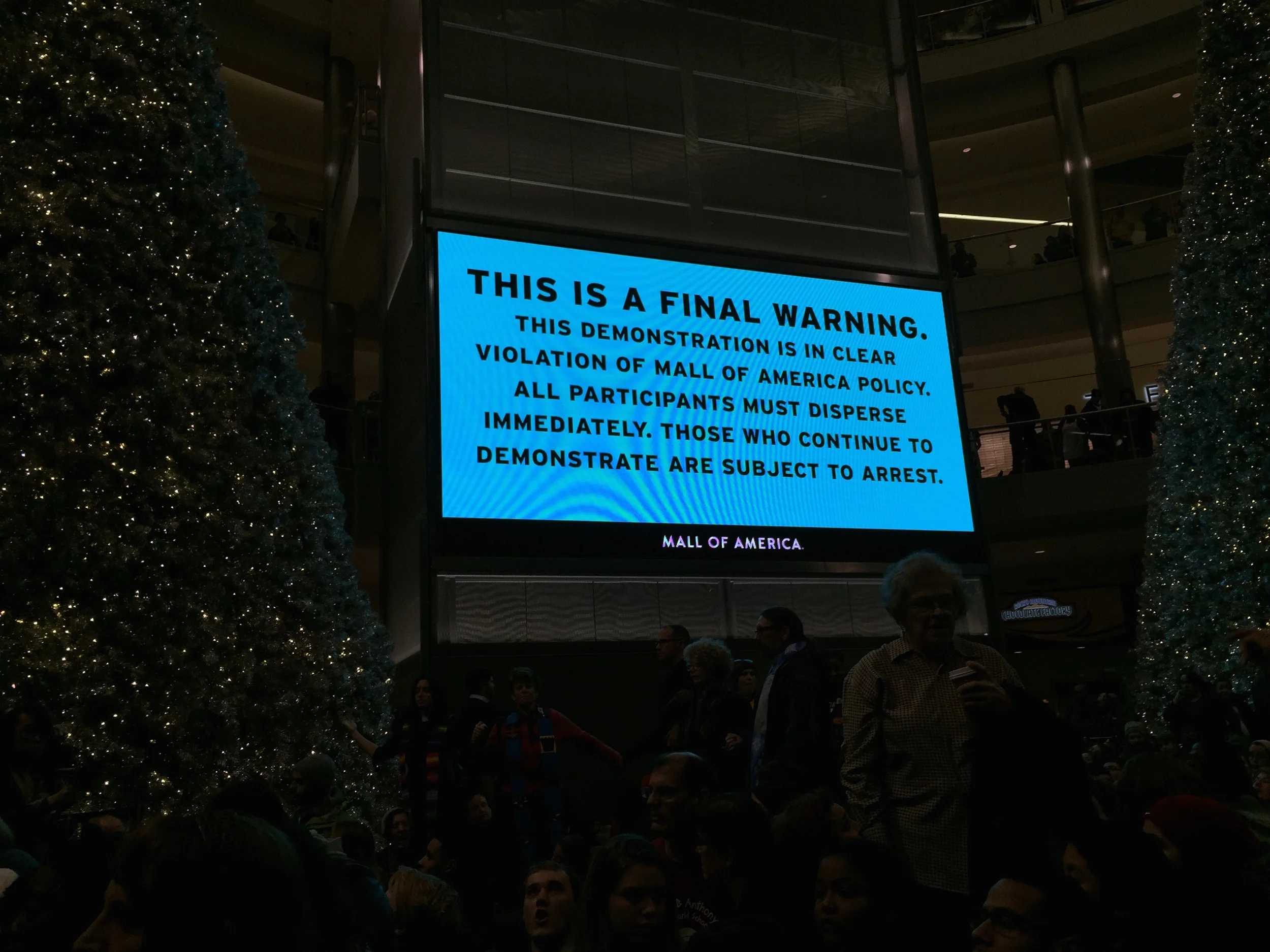By now you know that the city of Bloomington, Minnesota is choosing to prosecute organizers of a #BlackLivesMatter demonstration at Mall of America on December 20th.
I was there. The demonstration was entirely peaceful. Yet the mall and the city responded with ludicrously disproportionate force, including swarms of police officers in riot helmets and Orwellian electronic messages on giant screens. Sandra Johnson, the City Attorney for Bloomington, not only wants to prosecute organizers of the event, but to try to recover money to pay for the city’s paranoid overreaction.
After the charges were filed, I decided to go back and watch the Bloomington City Council Meeting from January 5th, the day demonstrators came to plead with the city not to prosecute organizers of the demonstration (you can watch all the archived meetings here, which, incidentally, is a really great civic service).
That meeting was an incredible microcosm of cooption, marginalization, and privilege.
The Council meeting began—and I’m not making this up—with an official proclamation honoring Martin Luther King, Jr. Day.
A man took the microphone to announce the proclamation and, in his best White Minnesotan patronizing tone, addressed the gathered supporters of #BlackLives Matter: “I think it’s quite interesting and a little bit timely for many of you who are attending here this evening.” That man was the mayor of Bloomington, Gene Winstead.
That a White mayor can, without the slightest hint of irony, get up and read a proclamation (pdf) that urges his residents to “remember and reflect on the principles of racial equality and nonviolent social change espoused by Martin Luther King, Jr.” in the same meeting that protestors literally pleaded with him, his council, and his city attorney not to prosecute them for leading the kind of nonviolent social change espoused by Martin Luther King, Jr., is one of the more incredible displays of willful self-denial, privilege, and power I’ve seen.
The satirical headline might be “White City Officials Honor Peaceful Protest of MLK; Advocate Prosecution of Peaceful Protestors.” Except, you know, wittier.
The cognitive dissonance of a nearly all-white city council honoring a man who advocated for Black lives in the same meeting that they stoically listened to pleas from community members not to be prosecuted for advocating for Black lives is almost too much, even for Minnesota.
Before supporters of #BlackLivesMatter were permitted to speak at the council meeting, they were first scolded by City Attorney Johnson.
Johnson began by saying, “The city prosecutor’s role does not include the luxury of selectively prosecuting cases that come before us. It never has. The city prosecutors cannot let politics or public opinion interfere with prosecutorial discretion. If it were to do that, it would result in de facto discrimination against some groups because their message was less favorable to the prosecutor’s political beliefs or the council’s political beliefs.” Later she said, “Civil disobedience has its price.”
Attorney Johnson repeatedly referred to the message of #BlackLivesMatter as a political belief, as if people are arguing over a damn tax levy or something. The statement that Black lives matter is not a political belief. It is an essentially human belief.
Some additional statements that are not political beliefs:
- In Minnesota, very HIGH income Black people were found to be 3.8 times more likely than very LOW income White people to be given subprime loans when purchasing a home.
- Despite using the drug at roughly the same rate, Black Minneapolis residents are over 11 times more likely than White residents to be arrested for marijuana possession. Eleven times.
These are not political beliefs of mine. They are statements that illuminate the cold, brutal fact of injustice in our community.
And let’s bring it a little closer to home for Attorney Johnson and Mayor Winstead, lest we naively persuade ourselves that this is only a problem in Minneapolis and St. Paul.
- According to U.S. Census Bureau estimates, while just under 7% of White Bloomington residents live below the poverty line, nearly 39% of Black residents do.
- According the Census Bureau, there are 35,905 occupied housing units in Bloomington. Just 1% of those units are occupied by Black owners, despite the fact that Blacks people make up 8.3% of the city population.
- According to the Census Bureau, the estimated unemployment rate for White Bloomington residents is 6.6%, while the rate for Black residents is 14.2%.
- According to the Minnesota Department of Education, Bloomington Kennedy and Jefferson High Schools educated 76.4% of their White students to academic proficiency, compared to just 32.3% of their Black students in 2014.
All of these facts represent blatant, egregious, unconscionable injustice in the city of Bloomington. But somehow, I suspect that Attorney Johnson has managed to afford herself the “luxury” not to take such staunch action to correct any of these injustices.
And this is the larger point: we care about the justice we choose to care about.
That goes for city attorneys, too. In a city that perpetuates gross injustice against its Black residents, Sandra Johnson, the city official charged with pursuing and upholding justice, is making the active choice to care about the kind of justice that insures white people are never impeded from Bath and Body Works, that economically powerful store owners are not precluded from even a minute of constant cash flow, that unbothered privileged folks are not disrupted for one second by the realities of their marginalized fellow citizens.
The specter of a white city attorney prioritizing “law and order” over the message that Black lives matter is part of a long American tradition, as is the Bloomington police’s incredible decision to send undercover spies to the meetings of Black citizens.
It’s useful to remind ourselves here that there is a firewall between the law and justice. We’ve successfully built our legal system in such a way that we can faithfully enforce our laws while simultaneously perpetuating ghastly racial injustice. And it’s that point that allows Attorney Johnson to be at ease with her conscience in believing that she is dutifully and impartially upholding the laws of her city and state, while nevertheless ruling over a local system of justice that is anything but just.
I have no doubt that Attorney Johnson is acting within the law as it is written. But she, and we, must make no mistake that she is choosing which justice she cares about, and that in upholding the letter of the law, she is nevertheless acting as an agent of injustice.
We designed the system to let her do that. By divorcing the law from justice, we allow (hell, encourage) people like Sandra Johnson to believe they are serving the people, irrespective of the oppressive realties some of those people endure.
And it is that divorce, fortified with the overpowering elixir of white privilege, that allows a white mayor, council, and attorney to snatch up the narrative of Dr. King, proclaim themselves self-anointed representatives of his legacy of justice, prosecute the same marginalized Black Americans Dr. King fought for for using the tactics he taught them and which they claim to lionize, and to sleep well at night, with the comforting knowledge that their souls are just.
After all, they’re just upholding the law.

